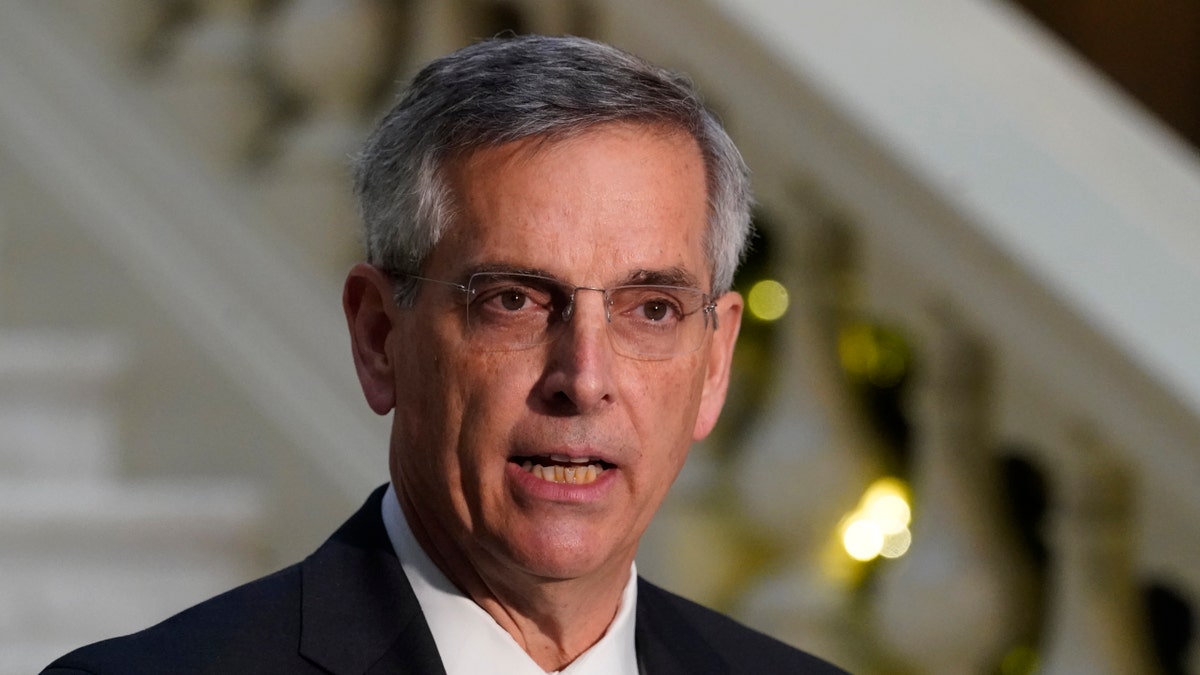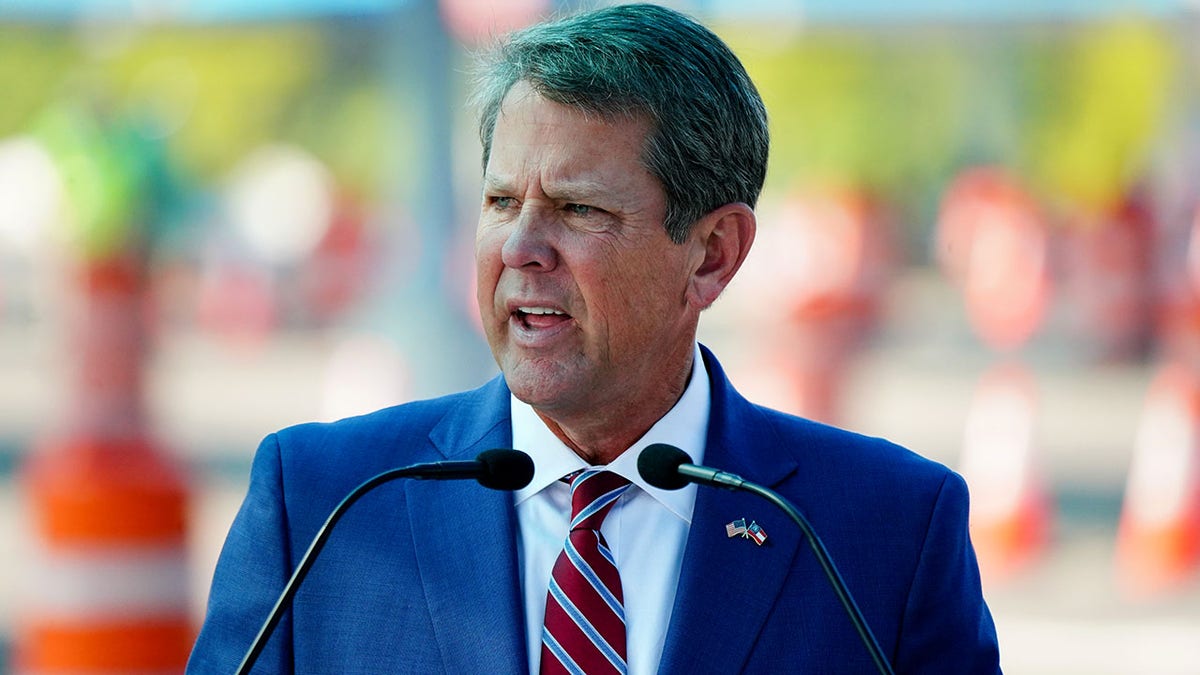MLB All-Star game to be played in Denver after leaving Georgia
Georgia Gov. Brian Kemp tells 'The Ingraham Angle' Colorado has more restrictive voting laws than Georgia
What's actually in the bill?
Among the most high-profile provisions of the controversial new Georgia election law is a change in how the state verifies the identity of voters who request and cast absentee ballots.
The change eliminates signature-matching -- a process that can be subjective at times -- as the method of confirming absentee voters' identities. Instead, if voters have a driver's license number or a state ID number, they are required to use that to verify who they are.
This change has been criticized by many as likely to make it more difficult for Georgians, specifically minorities who are more likely to vote Democratic, to vote by mail.
"The new election bill in Georgia is not about showing ID to vote," Atlantic writer Jemele Hill wrote. "Republicans are salty the state went blue, and they resent that their power was taken away by black voters. They want a rigged game because they’re too lazy to come up with a new vision and compete for votes."
"Georgia's new law imposes a new ID requirement to return an absentee ballot. There is no reason to do this other than Trump's lies," added Popular Information writer Judd Legum.
"Previously, Georgia law required voters to simply sign their absentee ballot applications. Now they will have to provide the number from a driver’s license or an equivalent state-issued identification," The New York Times wrote in an explainer about the law. "This is virtually certain to limit access to absentee voting."
But under the new law, Georgia voters who don't have a photo ID are still provided with a menu of options to confirm their identity when requesting or casting an absentee ballot.
According to Georgia Secretary of State Brad Raffensperger's office, voters can also verify their identities with the last four digits of their social security number; a utility bill; a bank statement; a government check; a paycheck; or another government document with their name and address on it.
Absentee ballot requests can be submitted electronically so voters can attach an image of their photo ID -- or one of the other forms of identification allowed if they don't have one. For mail ballots, voters can write their photo ID number. If they do not have that, they can write the last four digits of their social security number plus their birth date, Raffensperger's office said. And in the extraordinarily rare case a voter has neither, they can enclose a copy of a utility bill or other such document with their name and address.
This virtually assures that voters will never have to pay for copying services to submit an absentee ballot request.

Georgia Secretary of State Brad Raffensperger speaks during a presser Monday, Dec. 14, 2020, in Atlanta. Raffensperger, who slammed former President Donald Trump over his false claims that he won the presidential election, is has defended Georgia's new elections law. (AP Photo/John Bazemore)
GEORGIA VOTING LAW: READ FULL TEXT
Raffensperger's office noted that Georgians needed a photo ID to register to vote before this new law and will continue to need one after it is passed. The difference is simply limited to what is required when requesting and casting absentee ballots.
During an interview with The Daily Signal, Georgia Gov. Brian Kemp also noted that voters without driver's licenses or state IDs can still prove who they are with different documents.
"And I think it’s going to be a big help and it’s in no way going to alienate or disallow someone from the opportunity to vote because most people have these IDs," Kemp said. "If they don’t, we’ll give them one for free. And even if you don’t have that, there’s provisions in the bill where you can still get an absentee ballot by submitting other documents that are listed out in the legislation."
Raffensperger has separately defended requiring state ID for absentee ballots.
"There’s no rational argument against requiring state ID – provided for free to those who don’t have a driver’s license – for absentee ballots," the secretary of state said in a statement late last month. "I implemented our first version of that last year; every absentee ballot request that came in through the state website was cross-referenced with the driver’s license database and other records."

Georgia Governor Brian Kemp speaks during a press conference announcing expanded statewide COVID testing on August 10, 2020 in Atlanta, Georgia. Kemp recently signed a new elections law in Georgia. (Elijah Nouvelage/Getty Images)
Notably, Georgia's photo ID requirement for in-person voting, which has been in place for years, has not changed.
FACT-CHECKER DINGS BIDEN, MEDIA PUNDITS FOR DISINGENUOUS 'JIM CROW' CLAIMS ABOUT GEORGIA VOTING LAW
Raffensperger added: "The left said that photo ID for in-person voting would suppress votes. It didn’t. Registration and turnout soared, hitting new records with each election cycle. Their cataclysmic predictions about the effects of this law are simply baseless. The next election will prove that, but I won’t hold my breath waiting for the left and the media to admit they were wrong."
The secretary of state's office also noted that the vast majority of voters shouldn't encounter any difficulty with the new law. That's because 99% of active voters already have a driver's license, Social Security number or another valid ID number on file with the state.
"Total nonsense being pushed by Stacey Abrams and the Democrats," Stephen Lawson, the deputy executive director of Kelly Loeffler's "Greater Georgia" group, said. "The fact is this law expands access while strengthening the integrity of our elections—which is why Greater Georgia was proud to support it."
Republicans outside of Georgia have also harshly criticized opponents of the law for allegedly mischaracterizing it.
"More than 70 percent of Americans, including a majority of Democrats and a supermajority of independents, favor commonsense voter I.D. requirements; even so, Georgia will accept alternatives to driver’s licenses to verify absentee voters," Senate Minority Leader Mitch McConnell, R-Ky., said in a statement Monday. "All the facts disprove the big lie."
"You're gonna have all voters being able to have multiple ways to prove who they are. Drivers license, last four numbers of your social security number, even your utility bill or a free ID provided by the state of Georgia," former New Jersey Gov. Chris Christie said on ABC's "This Week" Sunday.
"Georgia's new election integrity law includes a common-sense provision to secure its absentee ballot system," Heritage Action president Jessica Anderson said in a statement to Fox News.
"Georgia has required photo IDs to vote in person for years, and now the same requirement applies to absentee ballots," she continued. "This is a smart step to ensure it's easy to vote and hard to cheat in Georgia and restore Georgians' trust in their election system. Anyone calling for boycotts clearly has not read the facts about the law."
CLICK HERE TO GET THE FOX NEWS APP
Outrage over the new voting law has led to immense pressure on corporations based in Georgia, like Delta and Coca-Cola, to condemn it. Major League Baseball even moved its annual All-Star Game from Atlanta.
The bill also includes a variety of other provisions, many of which are controversial.
It legalizes ballot drop boxes, which would not have been allowed in future elections independent of the new law -- but places some limits on when those boxes are accessible. It also shrinks the window for absentee ballots to be requested; expands early voting; and shifts responsibility in the State Election Board from the Secretary of State to a "nonpartisan" appointee selected by the state legislature; among other things.
Fox News' Cameron Cawthorne contributed to this report.














































